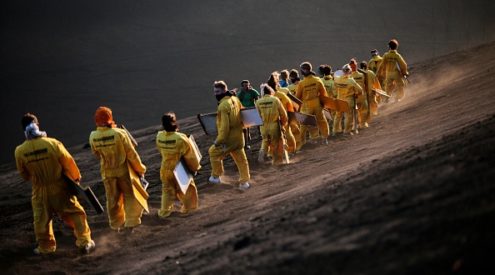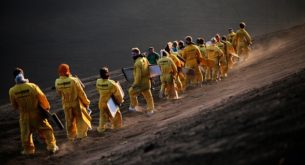Thousands of pre-term seal pups have washed up dead at Pelican Point in Namibia. According to a Facebook post by Sea Search, this is not the first time such a tragic occurrence has happened.
‘The Namibian Dolphin Project is currently coordinating with Naude at Ocean Conservation Namibia, our team on the ground, the local government (MFMR) and SA based scientists as well as wildlife vets associated with the Two Oceans Aquarium (Brett Gardner) who have experience of the relevant sampling to assist in monitoring this tragic event, ensuring other colonies are checked and that appropriate biological samples are collected and analysed where possible, and investigating possible causes,’ the organisation wrote.
‘In Cape fur seals, females usually drop their pups fairly synchronously between mid-Nov and early Dec, then mate soon afterwards with males holding harems of multiple females and continue to nurse their pups for another 9 months. This many dead pups will significantly reduce the numbers of pups born this season and throw off female mating too, impacting two years (at least) of reproduction.’
This is the situation at Pelican Point. All the little red circles mark dead seal pups. A rough estimate brings the…
Posted by Ocean Conservation Namibia on Tuesday, 13 October 2020
‘Many very thin females have been seen this year. Starvation or nutritional stress are likely an underlying factor in this as it has been noted before associated with large scale oceanographic events such as “Benguela Nino’s” (note we are entering an La Nina year),’ the organisation continued.
‘According to vet Dr Brett Gardner: “The list of possible causative factors is long and high rates of abortions are often caused by an interplay of more than one factor. So there are many considerations. With good quality sampling on fresh foetuses and associated dead adults we have the best possible chance of getting to a specific diagnosis.”’
‘In 1994 at Cape Cross, an estimated 10,000 seals died and 15,000 foetuses were aborted in a mass die off associated with starvation, likely resulting from a shortage of fish and secondary bacterial (Streptococcus phocae) infection. There was also a similar die off in the early 2000s and a few other occurrences. Multiple colonies have been checked and currently this has only been reported from Pelican Point in Walvis Bay,’ the post concluded.
Picture: Screenshot from video















